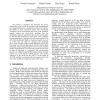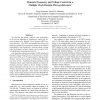173 search results - page 16 / 35 » Power Reducing Techniques for Clocked CMOS PLAs |
151
click to vote
ICCAD
2010
IEEE
14 years 11 months ago
2010
IEEE
Clock mesh is popular in high performance VLSI design because it is more robust against variations than clock tree at a cost of higher power consumption. In this paper, we propose ...
112
click to vote
IEEEPACT
2003
IEEE
15 years 7 months ago
2003
IEEE
We present a technique for reducing the power dissipation in the course of writebacks and committments in a datapath that uses a dedicated architectural register file (ARF) to hol...
131
click to vote
DAC
2010
ACM
14 years 11 months ago
2010
ACM
Clock meshes are extremely effective at filtering clock skew from environmental and process variations. For this reason, clock meshes are used in most high performance designs. Ho...
MICRO
2002
IEEE
15 years 6 months ago
2002
IEEE
We describe the design, analysis, and performance of an on–line algorithm to dynamically control the frequency/voltage of a Multiple Clock Domain (MCD) microarchitecture. The MC...
178
click to vote
ARVLSI
1995
IEEE
15 years 5 months ago
1995
IEEE
Precomputation is a recently proposed logic optimization technique which selectively disables the inputs of a sequential logic circuit, thereby reducing switching activity and pow...


